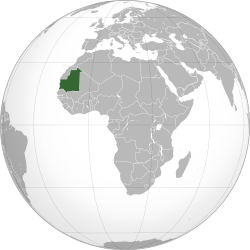Mauritania Thwarts Arms Deal
By Magharebia
By Jemal Oumar
Mauritanian gendarmerie units in Bassiknou foiled an arms deal that involved Touareg Islamist group Ansar al-Din.
The radical group, in control of Mali’s Timbuktu, was planning to strike a deal with a Mauritanian businessman to generate money to finance its terror activities.
Mauritanian army patrols stationed on the joint border near Fassala carried out the operation on August 24th, mauripress.info reported.

The security forces had obtained information about the transaction between Ansar al-Din and a Mauritanian trader from a double agent, Meida, operating for the Mauritanian army and al-Qaeda, local trader Heina Ould Zemzam told Magharebia.
“The double agent who revealed the operation had previously been detained for two months in Mauritanian prisons for collaboration with al-Qaeda,” he said. “As for the two parties to the deal, they were an Ansar al-Din member, Houseinou, who was planning to sell this heavy equipment which was seized by Ansar al-Din in the Malian village of Niafounké, and a trade mediator working for a Mauritanian businessman based in Nouakchott.”
The two men are now detained in Bassiknou pending their transfer to Nouakchott, Ould Zemzam said.
In related news, Mauritanian gendarmes on August 23rd arrested presumed salafists from Mali upon their arrival at a checkpoint in the Assaba province.
Mauritanian daily Essevir cited a security source as saying, “Three salafists crossed the border separately through a crossing near Bassiknou, but later met in the city of Laayoune, capital of the Hodh El Gharbi province in south-eastern Mauritania.”
They were under the surveillance of Mauritanian military intelligence when they boarded the vehicle in which they were arrested, according to the source.
“Such cases are frequently repeated these days due to the major pressure on the Mauritanian-Malian border, which is more than 2,000km long,” analyst Ibrahim Moustapha said.
“That long border strip was never tightly controlled as it’s virtually difficult to do that because of complexity of relations between the border area populations in both Mauritania and Mali, such as the trade exchange which is dictated by neighbourly relations and mutual needs,” he added. “In addition, ethnic and cultural similarities between the populations of those areas make it difficult to identify people involved.”
In his turn, Abdallah Ould Mohamedu, a dignitary of the eastern region, told Magharebia, “The border areas commonly used in crossing are witnessing intensive security and military presence by the Mauritanian army units, especially in the area between Mauritania’s Fassala and Mali’s Leyra to stop any similar cases.”
“Tightening the noose on armed groups and their agents from average citizens has considerably reduced infiltrations,” he added. “However, the pressing economic need facing Ansar al-Din and its inability to provide for the daily food needs of populations made them look for any means to generate money. This explains their desire to sell the assets they had seized, including large trucks, excavators and equipment.”
Ould Mohamedu added that this equipment was used by the Malian state in a development project, known as the Special Programme for Peace, Security and Development in Northern Mali (PSPSDN).
